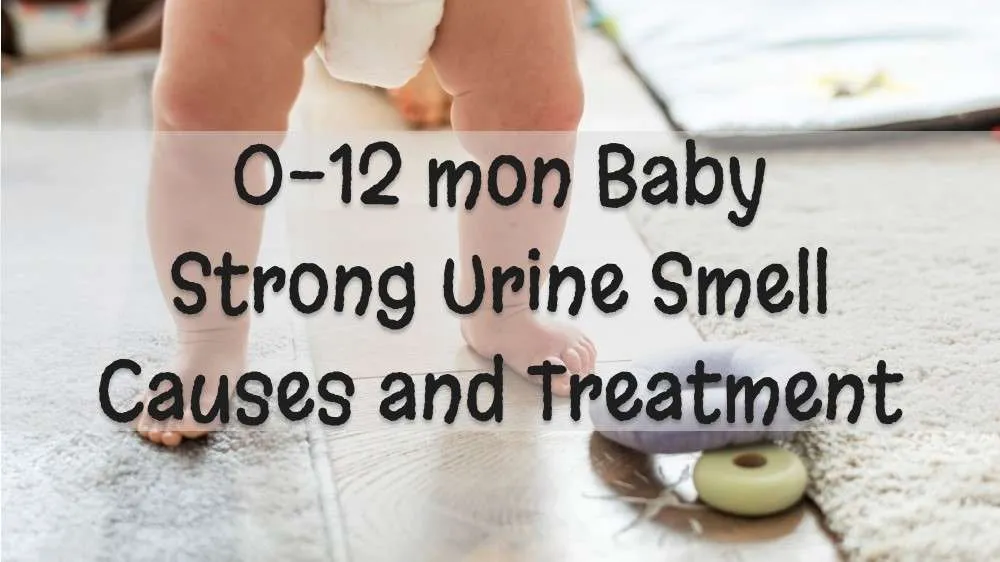It’s common for new parents to notice their baby’s urine has an unusually potent or strange odor at times. As the title asks – what causes baby strong urine smell in 0-12 month old babies and when does it indicate an issue needing treatment? This comprehensive guide covers normal baby urine scent ranges, potential reasons for foul aromatic pee, medical conditions associated with strange smells, and treatment options. With handy reference charts and actionable solutions, parents will learn how to identify when their baby’s strong urine odor warrants further evaluation.
Key Takeaways
- Normal baby urine has little to no scent generally
- Dehydration and vitamin C/B6 deficiency can cause a stinky aroma
- UTIs, kidney disease, and metabolic conditions often produce foul stagnant smells
- Treatment varies based on the underlying reason – fluids, diet changes, medications
- Describe specifics of timing, triggers, accompanying symptoms to your pediatrician
Typical Baby Urine Scent Progression
When babies are healthy and properly hydrated, their urine tends to have very little noticeable odor, especially in the first 6 months while exclusively milk-fed. Here’s a quick reference on the normal urine scent progression as they develop:
| Baby’s Age | Common Urine Scent |
|---|---|
| Newborn | Slightly sweet, no real scent |
| 1 month | No scent generally |
| 3 months | Possible faint smell |
| 6 months | Mild or gentle scent |
| 12 months | Mild scent typically |
Scent should never be overpowering or strange smelling in normal conditions
Of course individual variation happens. But a truly rancid, foul or chemical-like urine odor usually indicates an underlying medical issue.
What Causes Strong or Bad Smelling Pee in Babies?
Common reasons for unhealthy potent aroma in infants under a year old include:
Dehydration
When seriously dehydrated and not taking in enough fluids, babies’ bodies try to conserve water by concentrating the urine. This makes waste products more dense and smelly.
Dietary Reasons
- Starting solids – New proteins and nutrients change urine composition.
- Vitamin C deficiency – This vitamin helps degrade waste products.
- Vitamin B6 deficiency – B6 helps prevent buildup of harmful metabolites.
Infections
- Urinary tract infection – Bacteria multiply creating ammonia compounds and stagnant urine.
- Kidney infection – Backed up urine grows more bacteria and concentrated solutes.
Underlying Conditions
- Kidney disease – Impairs urine flow allowing bacteria and toxins to accumulate.
- Bladder outlet obstruction – Blockage traps urine leading to odor compounds.
- Metabolic disorder – Inability to process certain proteins or metabolites.
- Diabetes – Excess blood sugar dumped into urine pulls water out of body.
If you notice strong, strange smelling urine in your baby, take note of any possible related dietary changes, illnesses, medications or symptoms. This context helps determine next steps when you consult your pediatrician.
When to Call The Doctor About Foul Smelling Urine
Contact your baby’s doctor right away if their urine smells strongly of:
- Ammonia – Signals concentrated urine with too many waste products
- Rotten eggs – Suggests a UTI or metabolic disorder
- Maple syrup-like – May indicate maple syrup urine disease
- Moldy cheese – Could be Pseudomonas bacteria in a UTI
- Stale sweat stink – Common with an intestinal urinary conduit
- Other strange unrecognizable scents
Especially make an urgent appointment if you observe these red flags too:
- Dehydration – Dry mouth, no tears, less wet diapers, sunken soft spot in skull
- Failure to gain weight or leakage around catheter tube
- Dark brown, orange, or cola-colored urine
- Blood visible in the urine
- Increased thirst/appetite without explanation
- An ill appearance – vomiting, fever, paleness, breathing trouble
- Signs of pain while peeing – crying, straining
Don’t hesitate to call anytime strong odors accompany other symptoms – many underlying conditions require prompt treatment. Catching kidney problems and serious UTIs early prevents permanent damage long-term too.
How Are Strong Urine Odors Diagnosed in Babies?
To identify the cause of a strong urine smell, doctors can perform:
- Urinalysis – Checks levels of various waste products, blood cells, bacteria, proteins, etc.
- Urine culture – Confirms any infectious organism present and antibiotics needed.
- Blood tests – Assess kidney function, nutrient levels that influence urine odor, diabetic indicators.
- Bladder ultrasound – Images blockages like stones, an enlarged prostate, etc.
- MRI – Provides detailed views of urinary tract anatomy and function.
- Cystoscopy – A tiny camera on a tube looks inside the urethra and bladder.
- Biopsy – Examines kidney or bladder lining cell structure closer.
- Genetic testing – For suspected inherited disorders.
Based on clues in a baby’s history, exam, and urinalysis, doctors determine what combination of these tests will best diagnose the root cause.
How Are Smelly Urine Conditions Treated in Infants?
Treatment varies based on the specific reason for your baby’s strong urine odor, but may include:
Hydration Support
- Electrolyte-balanced fluids by mouth or IV to rehydrate and flush systems.
- Adjusting feeding amounts and timing if related to overfeeding or volume issues.
Diet Adjustments
- Vitamin C, B-complex, or other supplements if deficiency is found.
- Changes in mother’s diet if breastfeeding.
- Switching infant formula brand if related to allergy or intolerance.
Medications
- Prescribed antibiotics to treat an underlying UTI or kidney infection.
- Medicated bladder washes for fungus or resistant bacteria.
- Alpha-blockers to relax urethral/prostate muscles if obstruction found.
- Enzymes, amino acids or other meds to aid metabolic disorders.
Bladder Drainage
- Emergency Foley catheter insertion if critically unable to urinate.
- Suprapubic tube into bladder if urethra impaired.
Surgery
- Repair structural kidney blockages or bladder outlet issues.
- Partial kidney removal if scarring or poorly functioning.
Through testing, doctors determine the optimum treatment plan to resolve urine stench issues and support systemic healing.
Conclusion of Baby Strong Urine Smell
While the occasional stronger whiff from a baby’s urine can happen normally with changing foods, consistent putrid or unrecognizable scents often mean clinical intervention is required. Pay close attention to urine odor in tandem with assessing your baby’s hydration maintenance, diet sufficiency, medications started, and acute illness symptoms when deciding if strong smelling pee warrants emergency care or standard appointment scheduling. Through laboratory urinalysis and additive testing like ultrasounds when necessary, pediatricians determine why stagnant aromatic compounds are accumulating so the underlying disorder can be treated. Catching structural problems early prevents lifelong kidney issues.
Frequently Asked Questions
What does it mean if my newborn’s pee smells really bad?
In newborns, very foul stagnant-smelling urine is abnormal and reason to call the pediatrician promptly. It may signal dehydration from inadequate feeding, a high-grade UTI, or rarely a metabolic condition. Identify any fever, excessive crying, or feeding issues too. Slightly strong urine typically appears after starting some solid foods around 6 months old on average as contents change.
Is it normal for a 2 month old to have smelly pee sometimes?
Typically a 2 month old exclusively breastfed or formula-fed baby should still have little to no real urine odor yet. Definite strong scents at this age often do indicate dehydration or possibly a UTI – the bladder and kidneys are still very vulnerable to infection this young. Discuss specifics on timing, strength of smell, appearance and any pain cues with your pediatrician soon.
Should I worry if my 5 month old’s urine smells gross occasionally?
As babies start some solids around 4-6 months old, more protein digestion can begin to influence urine contents and aroma at times. So an occasional stronger scent may happen. But consistently potent, strange or foul urine still warrants medical attention to check for a UTI or kidney problem. Especially if it coincides with pain, crying, fever or reduced wet diapers, call your doctor.
What causes a 10 month old’s urine to have a strong stench daily?
In an older baby of 10-12 months eating varied foods, urine can take on stronger odors as byproducts from expanding nutrition change its composition. Still, a consistently and noticeably more potent aroma, rather than just being mildly detectable, usually signals concentrated urine from some mild dehydration or the need for better hydration maintenance. Verify the baby is getting plenty of wet diapers and fluids. Discuss options like electrolyte water between whole feedings if strong odors persist over 3 days.
When should I take my 9 month old to the doctor for smelly urine?
You should promptly contact your baby’s doctor about consistent foul or excessively strong urine odors at 9 months old if they occur along with pain or crying while peeing, reduced typical wet diapers daily, signs of dehydration, any vomiting/diarrhea sickness, or if the stink persists more than several days inexplicably. Dark, bloody, sugary or chemical-like pee scents also warrant urgent evaluation for a UTI or metabolic imbalance that needs treatment.
What is the best way to control my baby’s smelly urine?
The best ways to help control your baby’s smelly urine generally involve first identifying what underlying factor is altering urine composition, through tests if necessary. Treating infections, preventing vitamin deficiencies, and optimal hydration maintenance can all help reduce excess waste buildup causing odor. Talk to your pediatrician about monitoring your baby’s specific dietary intake, developmental changes, and urine characteristics in order to pinpoint areas to target for better scent control.
Should my baby take vitamins if urine smells strong?
Your baby should only start vitamin supplements under the guidance of their pediatrician based on clinical assessment, not independently in response to urine odor changes. There are risks like overdose with fat-soluble types. That said, yes foul-smelling urine can indicate a nutrient deficiency and doctors may recommend a balanced vitamin with minerals after lab testing confirms what is specifically lacking. Don’t give vitamins before discussing urine changes with your pediatrician first.
How can I help my baby’s smelly pee if changing formula doesn’t help?
If your baby continues having strong or strange urine odor even after changing formulas to rule out a formula allergy reaction, take them to your pediatrician for evaluation. Make notes on when odor happens, diaper counts, appearance, other symptoms. Smelly urine persisting despite a formula change may mean a different issue like a UTI, metabolic problem, or vitamin shortage. Identifying and properly treating the root cause is needed to reduce poor urine scent.
What’s the best baby formula for avoiding smelly urine?
There is no one “best” formula uniquely proven to prevent all smelly urine in babies. But some hypoallergenic and gentle blends like PurAmino or Nutramigen do often help reduce strong scents babies have due to protein intolerances. Compared to milk-based types, soy formulas also influence urine contents and odor differently. Discuss options with your pediatrician based on your baby’s specific diet, urine study findings, and sensitivities observed overtime to pinpoint an optimal match for their needs.
When should you call a doctor about a baby’s abnormal urine smell?
You should call your baby’s pediatrician anytime their urine has a potently abnormal or strange scent – especially if ammonia-like, sweet, moldy, or chemical. Strong odor with dark appearance, reduced wet diapers, pain peeing, vomiting, fever or other concerning symptoms also warrants an urgent call, even during off hours. Catching UTIs early prevents kidney damage. Diagnosing rare metabolic issues quickly helps optimize nutrition for healthy development. Don’t wait with truly foul baby urine concerns.









